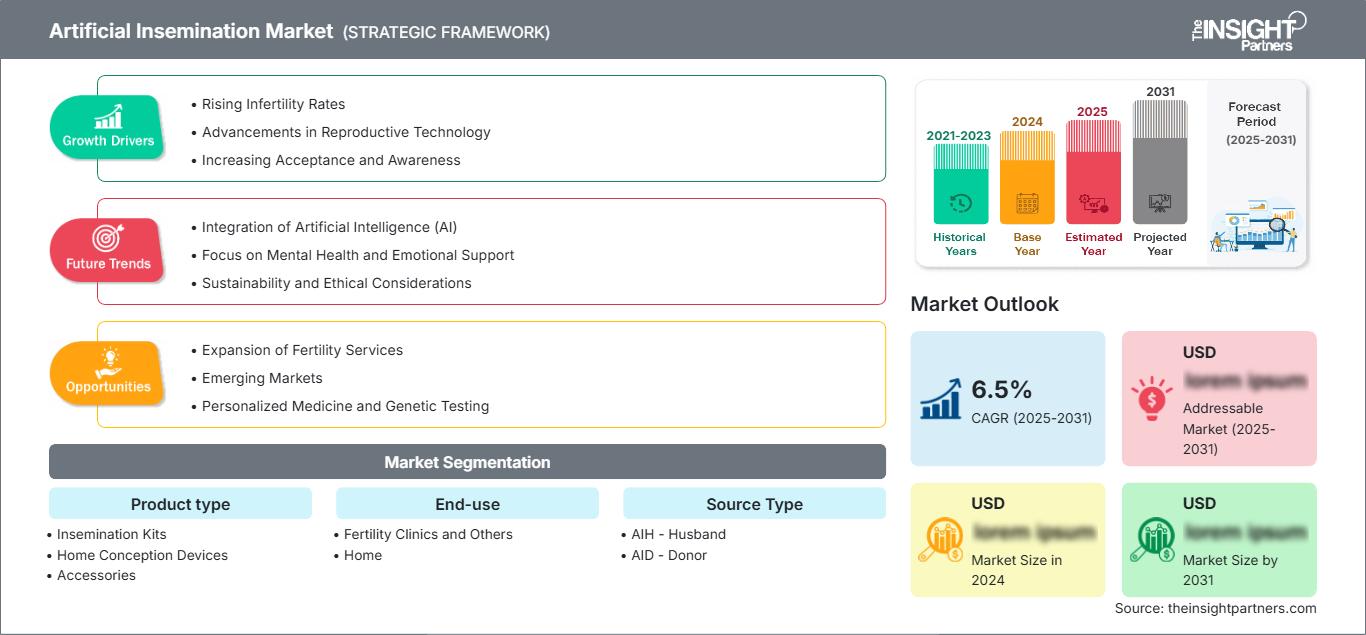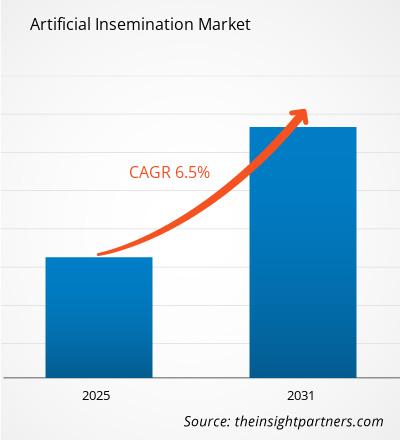Der Markt für künstliche Befruchtung wird bis 2031 voraussichtlich ein Volumen von 4,71 Milliarden US-Dollar erreichen. Für den Zeitraum 2025–2031 wird ein jährliches Wachstum von 8,0 % erwartet.
Der Bericht ist nach Produkttyp (Inseminationssets, Heimbefruchtungsgeräte, Zubehör) und Endverbraucher (Kinderwunschkliniken und andere, Heimbefruchtung) segmentiert. Die Segmentierung erfolgt außerdem nach Samenquelle (Ehepartner, Spender) und Technik (intrauterine Insemination, intrazervikale Insemination, intravaginale Insemination, intratubare Insemination). Die globale Analyse wird zudem auf regionaler Ebene und für wichtige Länder aufgeschlüsselt. Der Bericht gibt den Wert der oben genannten Analysen und Segmente in USD an.
Zweck des Berichts
Der Bericht „Markt für künstliche Besamung“ von The Insight Partners beschreibt die aktuelle Marktlage und das zukünftige Wachstum, die wichtigsten Triebkräfte, Herausforderungen und Chancen. Er bietet Einblicke für verschiedene Akteure im Markt, wie z. B.:
- Technologieanbieter/Hersteller: Um die sich entwickelnde Marktdynamik zu verstehen und potenzielle Wachstumschancen zu erkennen, können sie fundierte strategische Entscheidungen treffen.
- Investoren: Um eine umfassende Trendanalyse hinsichtlich Marktwachstumsrate, Finanzprognosen und Chancen entlang der Wertschöpfungskette durchzuführen.
- Regulierungsbehörden: Um Richtlinien zu regulieren und Aktivitäten auf dem Markt zu überwachen, mit dem Ziel, Missbrauch zu minimieren, das Vertrauen der Investoren zu wahren und die Integrität und Stabilität des Marktes zu gewährleisten.
Marktsegmentierung für künstliche Befruchtung Produkttyp
- Inseminationssets
- Heimbefruchtungsgeräte
- Zubehör
Endverwendung
- Kinderwunschkliniken und andere
- Zuhause
Quellentyp
- AIH - Ehemann
- AID - Spender
Technik
- Intrauterine Insemination
- Intrazervikale Insemination
- Intravaginale Insemination Intratubale Insemination
- Intratubale Insemination
Sie erhalten kostenlos Anpassungen an jedem Bericht, einschließlich Teilen dieses Berichts oder einer Analyse auf Länderebene, eines Excel-Datenpakets sowie tolle Angebote und Rabatte für Start-ups und Universitäten.
Markt für künstliche Befruchtung: Strategische Einblicke

- Holen Sie sich die wichtigsten Markttrends aus diesem Bericht.Dieses KOSTENLOSE Beispiel umfasst Datenanalysen, die von Markttrends bis hin zu Schätzungen und Prognosen reichen.
Wachstumstreiber des Marktes für künstliche Befruchtung
- Steigende Unfruchtbarkeitsraten: Die weltweit zunehmende Unfruchtbarkeit von Paaren ist ein wichtiger Wachstumstreiber für den Markt für künstliche Befruchtung. Veränderungen des Lebensstils, Umwelteinflüsse und ein späteres Kinderwunschalter tragen weltweit zu den steigenden Unfruchtbarkeitsfällen bei. Die Weltgesundheitsorganisation schätzt, dass etwa 15 Prozent der Paare von dieser Erkrankung betroffen sind. Der stetig wachsende Einsatz assistierter Reproduktionstechniken ermutigt Gesundheitseinrichtungen, diese Dienstleistungen einzuführen und auszubauen.
- Fortschritte in der Reproduktionstechnologie: Technologische Fortschritte haben die künstliche Befruchtung deutlich effizienter und erfolgreicher gemacht. Beispiele für Methoden zur Spermienkonservierung sind die Kryokonservierung, mit der Spermien über lange Zeiträume gelagert werden können. Dadurch ist der Zugriff auf die gelagerten Spermien sowohl in der Human- als auch in der Veterinärmedizin einfacher. Fortschritte in der Diagnostik, wie Ultraschall und Hormonanalysen, ermöglichen zudem eine präzisere Planung der Befruchtung und somit höhere Erfolgsraten. Sowohl Kinderwunschkliniken als auch Tierzuchtprogramme sind wichtige Marktfaktoren, die die Nachfrage antreiben.
- Zunehmende Akzeptanz und Aufklärung: Es hat einen grundlegenden Wandel in der gesellschaftlichen Einstellung zur assistierten Reproduktionstechnologie gegeben. Viele Menschen sind nun bereit, Hilfe bei ihrer Unfruchtbarkeit zu suchen, da das Bewusstsein für die damit verbundenen Probleme gestiegen ist. Dank zahlreicher Berichte von Prominenten und der Bemühungen verschiedener Organisationen, die Missverständnisse über Unfruchtbarkeit ausräumen wollten, wurde diese Erkrankung entstigmatisiert und die Vorteile der künstlichen Befruchtung umfassend dargestellt. Auch die Informationsangebote tragen dazu bei, dass potenzielle Patientinnen und Patienten ihre Möglichkeiten besser verstehen können. Das stetig wachsende Wissen und die zunehmende Akzeptanz zählen zu den Hauptgründen für das Wachstum des Marktes für künstliche Befruchtung.
Zukunftstrends im Markt für künstliche Befruchtung
- Integration von Künstlicher Intelligenz (KI): Die Integration von Künstlicher Intelligenz (KI) in den Markt für künstliche Befruchtung ist ein aufkommender Trend, der vielversprechende Ergebnisse für Patientinnen und Patienten verspricht. KI kann große Datensätze analysieren und Muster erkennen, die die Erfolgsraten bestimmter Fruchtbarkeitsbehandlungen vorhersagen können. Die Spermienselektion wird verbessert und die Insemination mithilfe von Algorithmen des maschinellen Lernens hinsichtlich des Zeitpunkts optimiert, wodurch die Ergebnisse verbessert werden. Darüber hinaus unterstützen KI-basierte Plattformen Gesundheitsdienstleister beim Patientendatenmanagement, der Optimierung von Abläufen und der Erstellung individualisierter Behandlungspläne und steigern so die Effektivität von Kinderwunschkliniken.
- Fokus auf psychische Gesundheit und emotionale Unterstützung: Unfruchtbarkeit ist für viele Menschen mit einer emotionalen und psychologischen Belastung verbunden. Daher rückt die psychologische Unterstützung im Rahmen von Fruchtbarkeitsbehandlungen immer stärker in den Fokus. Viele Paare mit unerfülltem Kinderwunsch erleben Enttäuschung, Depressionen und Angstzustände aufgrund ihrer ausbleibenden Schwangerschaft. Die psychische Gesundheit wird zunehmend in Kinderwunschkliniken integriert, vor allem durch Beratungsangebote und Selbsthilfegruppen. Diese Maßnahmen verändern die Kinderwunschbehandlung grundlegend, indem sie den Patientinnen und Patienten emotionale Unterstützung bieten und so die gesamte Behandlungserfahrung verbessern, was wiederum zu besseren Ergebnissen und höherer Patientenzufriedenheit führt.
- Nachhaltigkeit und ethische Aspekte: Im Zuge des Wandels hin zu mehr Nachhaltigkeit im Gesundheitswesen wandelt sich auch die künstliche Befruchtung hin zu ethischen und ökologischen Ansätzen. Die Anwendung umweltfreundlicher klinischer Protokolle reduziert Abfall und verwendet nachhaltigere Materialien, während gleichzeitig ein verantwortungsvoller Umgang mit und die Lagerung von Gameten gewährleistet werden. Ein weiterer wichtiger Aspekt sind die kontroversen Fragen der Anonymität der Spender und die Ethik reproduktionsmedizinischer Verfahren. Der Auswahlprozess sollte transparent sein und alle ethischen Richtlinien einhalten, um Vertrauen und Integrität im Bereich der künstlichen Befruchtung zu gewährleisten.
Marktchancen der künstlichen Befruchtung
- Erweiterung der Fruchtbarkeitsbehandlungen: Der Markt für künstliche Befruchtung hat zahlreiche Möglichkeiten zur Erweiterung der Fruchtbarkeitsbehandlungen geschaffen. Die meisten Kliniken bieten mittlerweile umfassende Pakete an, die Beratung, Fruchtbarkeitstests und individuell abgestimmte Behandlungspläne beinhalten. Diese umfassenden Leistungen verbessern die Fähigkeit der Kliniken, eine Reihe von Patientenproblemen anzugehen und die Behandlungsergebnisse deutlich zu steigern. Ergänzende Leistungen wie Ernährungsberatung, Stressmanagement und psychologische Unterstützung können die Behandlungsergebnisse durch einen besseren Marktzugang weiter verbessern.
- Wachstumsmärkte: Die Nachfrage nach künstlicher Befruchtung steigt, insbesondere in Wachstumsmärkten. Mit der Verbesserung der wirtschaftlichen Lage und dem gestiegenen Bewusstsein für reproduktive Gesundheit werden neue Chancen in den Ländern des asiatisch-pazifischen Raums, Lateinamerikas und Afrikas erwartet. Verbesserungen der Gesundheitsinfrastruktur in diesen Märkten führen zu erheblichen Investitionen von Regierungen und privaten Organisationen und bieten somit ideale Bedingungen für die Ansiedlung von Kinderwunschkliniken. Der Markteintritt eröffnet Unternehmen die Möglichkeit, von der steigenden Nachfrage nach reproduktionsmedizinischer Versorgung zu profitieren und maßgeblich zum globalen Wachstum der künstlichen Befruchtung beizutragen.
- Personalisierte Medizin und Gentests: Dieser Trend zur personalisierten Medizin findet erstmals auch in der Reproduktionsmedizin Anwendung und bringt Innovationen in den Markt für künstliche Befruchtung. Gentests und ein individueller Behandlungsplan, der auf das jeweilige Patientenprofil zugeschnitten ist, können die Erfolgsraten deutlich verbessern. Ein Beispiel hierfür ist die Identifizierung genetischer Erkrankungen vor der Empfängnis, um Paaren fundierte Entscheidungen hinsichtlich ihrer reproduktionsmedizinischen Möglichkeiten zu ermöglichen. Kinderwunschkliniken können diese Technologie nutzen, um Patienten zu gewinnen und personalisierte Lösungen anzubieten, da Gentests immer zugänglicher und erschwinglicher werden.
Markt für künstliche Besamung
Die regionalen Trends und Einflussfaktoren auf den Markt für künstliche Befruchtung im gesamten Prognosezeitraum wurden von den Analysten von The Insight Partners ausführlich erläutert. Dieser Abschnitt behandelt außerdem die Marktsegmente und die geografische Verteilung des Marktes für das Management von Herzrhythmusstörungen in Nordamerika, Europa, dem asiatisch-pazifischen Raum, dem Nahen Osten und Afrika sowie Süd- und Mittelamerika.
Umfang des Marktberichts zur künstlichen Besamung
| Berichtsattribut | Einzelheiten |
|---|---|
| Marktgröße in 2024 | US$ XX Billion |
| Marktgröße nach 2031 | US$ 4.71 Billion |
| Globale CAGR (2025 - 2031) | 8.0% |
| Historische Daten | 2021-2023 |
| Prognosezeitraum | 2025-2031 |
| Abgedeckte Segmente |
By Produkttyp
|
| Abgedeckte Regionen und Länder | Nordamerika
|
| Marktführer und wichtige Unternehmensprofile |
|
Die Dichte der Akteure im Markt für künstliche Besamung: Ein Überblick über ihre Auswirkungen auf die Geschäftsdynamik
Der Markt für künstliche Befruchtung wächst rasant, angetrieben durch die steigende Nachfrage der Endverbraucher. Gründe hierfür sind unter anderem sich wandelnde Verbraucherpräferenzen, technologische Fortschritte und ein wachsendes Bewusstsein für die Vorteile des Produkts. Mit steigender Nachfrage erweitern Unternehmen ihr Angebot, entwickeln innovative Lösungen, um den Bedürfnissen der Verbraucher gerecht zu werden, und nutzen neue Trends, was das Marktwachstum zusätzlich beflügelt.

- Holen Sie sich die Markt für künstliche Befruchtung Übersicht der wichtigsten Akteure
Wichtigste Verkaufsargumente
- Umfassende Abdeckung: Der Bericht bietet eine umfassende Analyse der Produkte, Dienstleistungen, Typen und Endnutzer des Marktes für künstliche Besamung und vermittelt so ein ganzheitliches Bild.
- Expertenanalyse: Der Bericht basiert auf dem fundierten Wissen von Branchenexperten und Analysten.
- Aktuelle Informationen: Der Bericht gewährleistet Geschäftsrelevanz durch die Berücksichtigung aktueller Informationen und Datentrends.
- Anpassungsmöglichkeiten: Dieser Bericht kann an spezifische Kundenanforderungen angepasst werden und sich optimal in die Geschäftsstrategien integrieren.
Der Forschungsbericht zum Markt für künstliche Besamung kann somit maßgeblich dazu beitragen, das Branchenszenario und die Wachstumsaussichten zu entschlüsseln und zu verstehen. Auch wenn einige berechtigte Bedenken bestehen, überwiegen die Vorteile dieses Berichts insgesamt die Nachteile.
- Historische Analyse (2 Jahre), Basisjahr, Prognose (7 Jahre) mit CAGR
- PEST- und SWOT-Analyse
- Marktgröße Wert/Volumen – Global, Regional, Land
- Branchen- und Wettbewerbslandschaft
- Excel-Datensatz
Aktuelle Berichte
Erfahrungsberichte
Grund zum Kauf
- Fundierte Entscheidungsfindung
- Marktdynamik verstehen
- Wettbewerbsanalyse
- Kundeneinblicke
- Marktprognosen
- Risikominimierung
- Strategische Planung
- Investitionsbegründung
- Identifizierung neuer Märkte
- Verbesserung von Marketingstrategien
- Steigerung der Betriebseffizienz
- Anpassung an regulatorische Trends




















 Kostenlose Probe anfordern für - Markt für künstliche Befruchtung
Kostenlose Probe anfordern für - Markt für künstliche Befruchtung